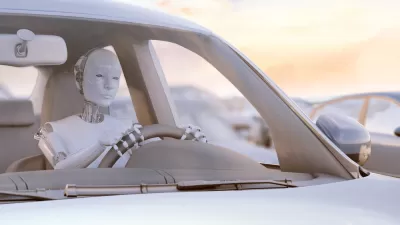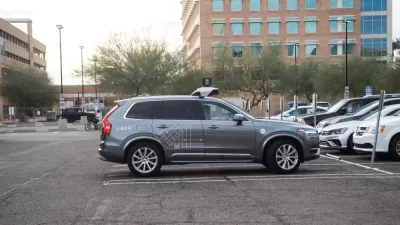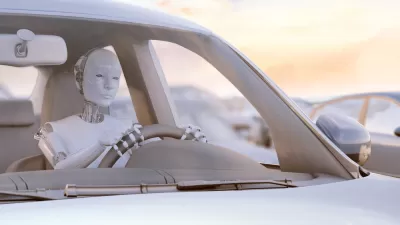At the dawn of automated vehicle technology, humans, and Americans in particular, should recall the shortcomings of past utopian visions.

William Leimenstoll notices a few similarities in the utopian visions of transportation technology boosters nearly a century ago with those of the current day. In fact, writes Leimenstoll, "[i]f you switch the publishing years and the technology named, many articles extolling the virtue of automated vehicles (AVs) would be remarkably indistinguishable from those supporting urban freeways decades ago."
The article details the marketing efforts that drove the popular and political support for the Interstate Highway System, as well as the unintended consequences of that epoch-defining infrastructure investment. While freeways made home ownership a reality for more Americans, they also eroded the economic and social fabric of central cities, for example. The current moment should inspire caution, according to Leimenstoll, not uncritical exuberance.
"Clearly, momentum for smarter, more sustainable communities is growing, but enthusiasm for AVs threatens to derail this success," writes Leimenstoll. "Without learning from the pitfalls of our eager embrace of urban highways, communities may make the same mistakes again."
So for instance, while automated vehicles might bring incredible benefits in traffic safety and congestion, it could also induce demand, increasing wear and tear on roads and negative environmental outcomes. With both sides of the spectrum of potential effects in mind, Leimenstoll concludes the article by suggesting some steps for planners to begin taking as soon as possible.
FULL STORY: An “Unprecedented Mobility Revolution?” We’ve Been Here Before

Planetizen Federal Action Tracker
A weekly monitor of how Trump’s orders and actions are impacting planners and planning in America.

Maui's Vacation Rental Debate Turns Ugly
Verbal attacks, misinformation campaigns and fistfights plague a high-stakes debate to convert thousands of vacation rentals into long-term housing.

San Francisco Suspends Traffic Calming Amidst Record Deaths
Citing “a challenging fiscal landscape,” the city will cease the program on the heels of 42 traffic deaths, including 24 pedestrians.

Defunct Pittsburgh Power Plant to Become Residential Tower
A decommissioned steam heat plant will be redeveloped into almost 100 affordable housing units.

Trump Prompts Restructuring of Transportation Research Board in “Unprecedented Overreach”
The TRB has eliminated more than half of its committees including those focused on climate, equity, and cities.

Amtrak Rolls Out New Orleans to Alabama “Mardi Gras” Train
The new service will operate morning and evening departures between Mobile and New Orleans.
Urban Design for Planners 1: Software Tools
This six-course series explores essential urban design concepts using open source software and equips planners with the tools they need to participate fully in the urban design process.
Planning for Universal Design
Learn the tools for implementing Universal Design in planning regulations.
Heyer Gruel & Associates PA
JM Goldson LLC
Custer County Colorado
City of Camden Redevelopment Agency
City of Astoria
Transportation Research & Education Center (TREC) at Portland State University
Jefferson Parish Government
Camden Redevelopment Agency
City of Claremont





























